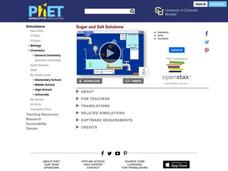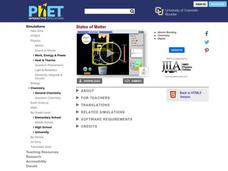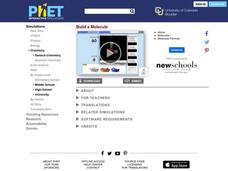PHET
Energy Skate Park: Basics
Keep calm and half pipe. An exciting simulation teaches pupils about energy transfer from potential to kinetic and thermal as a skater moves through a half pipe or other track. After a brief introduction, scholars can build their own...
PHET
Energy Skate Park
Apply the concepts of conservation of energy to a skater to introduce a fun way the concepts apply to real life. Scholars build tracks, ramps, and jumps then analyze the various types of energy and friction. For an added challenge,...
PHET
Forces and Motion
The average American will move 12 times, which results in a lot of moving furniture! Class members consider the forces required to move objects with a creative simulation that opens with the forces required to push a filing cabinet....
PHET
Faraday's Electromagnetic Lab
"But still try, for who knows what is possible." - Michael Faraday. Faraday's advice features in a simulation that permits pupils to play with a bar magnet in order to make a light bulb glow connecting electromagnetic induction to...
PHET
Energy Forms and Changes
Is the ice cooling down the water or is the water melting the ice? Here is a simulation that explores thermal energy transfer with iron, brick, and water. It demonstrates the flow of energy and what happens when each material is either...
National Park Service
It's Not Easy Being Grizz
Grizzly bears can be up to 600 pounds and require a great deal of food, especially to survive hibernation. Comprised of multiple games, the third lesson of five only uses one setup. Pupils run around a large field, sorting and collecting...
National Park Service
Nutcracker Fantasy
The Clark's nutcracker bird hides seeds in 25,000 different sites every year to save for winter. Lesson demonstrates how difficult it would be to find these seeds months later when they need them for food. In the first of five lesson,...
PHET
The Greenhouse Effect
How do greenhouse gases impact temperature? Have your classes use the interactive software to explore different concentrations of greenhouse gases and their effect on climate. Learners can recreate different atmospheric concentrations...
PhET
Wave on a String
The sound waves of thunder are made when lightning very quickly heats the air surrounding it, expanding faster than the speed of sound. Learners explore waves through their own movement of string or set waves to constantly oscillate....
PhET
Beer's Law Lab
Beer's Law can be used to measure the concentration of certain compounds in samples of food. In the concentration simulation, particpants change and measure the concentration of different solutions by manipulating various types of...
PHET
Simplified MRI
Cancerous tissues contain more water than normal tissue, which causes the cancerous tissue to resonate longer on the screen and be seen. High school learners can see how MRIs detect tumors in someone's head. Radio transmitters emit their...
PhET
Sugar and Salt Solutions
Ionic bonds form from electrostatic energy, allowing for higher conductivity than those seen in covalent bonds. In the simulation, learners add sugar and salt to water and see the effects on concentration and conductivity of their...
PhET
States of Matter
Water is the only molecule on Earth that can naturally exist in all three states of matter. The interactive simulation shows different molecules changing states of matter with the addition or removal of heat. Learners then see how...
PhET
Reactants, Products and Leftovers
Did you know when you mix the reactants sulfur, tungsten, and silver, you get the products SWAg? The simulation begins with making sandwiches, to show pupils reactants and products of something familiar. They then can make water,...
PhET
Radioactive Dating Game
Uranium 235 has a half-life of over 700 million years and is the fuel used in the atomic bomb dropped on Hiroshima, Japan. Pupils see the half-lives and decay rates of Carbon-14 and Uranium-238. They also take measurements of these two...
PhET
Molecule Shapes
The shape of a molecule is determined by the arrangement of atoms around the central atom and lone pairs of electrons. Scholars build models of molecules using single, double, and triple bonds. They can then see real molecules bond...
PhET
Isotopes and Atomic Mass
Some isotopes are unstable, or radioactive, meaning they will decay over time and turn into another isotope or stable element. In the interactive simulation, participants manipulate elements to create isotopes and gather information....
PhET
Molecule Shapes: Basics
In molecules, bonds rotate about the nucleus due to the repulsion of subatomic particles. In a simulation, learners manipulate the bonds of a molecule to meet the atoms' needs. They can then see the specific molecular shapes of five...
PhET
Build a Molecule
How many different molecules can you build? In a simulation, learners make molecules from given atoms. There are numerous collections from which to build three to five molecules from given kits of atoms. Scholars can also view their...
PhET
Acid-Base Solutions
Learners, through watching a simulation, can manipulate various characteristics of different solutions focusing on acid-base solutions where pH, strength of solution, and concentration may be changed. Views may be at the molecular level,...
National Park Service
Fire Ecology on the Rim
An engaging unit on wildfires includes three sections, including a background section with eight lessons and five activities, a field experience section with 13 lessons and five activities, and a conclusion section featuring an analysis...
PricewaterhouseCoopers
The Stock Market
Keep or sell? Young learners simulate as buyers in the stock market while learning about the benefits and important factors to know when purchasing. The thorough resource allows for observation of case studies and provides an assessment...
Manitoba Education and Early Childhood Learning
Forensic Sciences: A Crime Scene Investigation Unit
Mr. Bergman has been murdered and we need you to solve the crime! The cross-curricular unit covers 11 different types of forensic science and includes 17 activities. Scholars perform blood type analysis, blood spatter analysis, height...
PHET
Planetary Magnetism
What do magnetic fields look like? The best way to learn about magnetic fields is to try identifying them for yourself. Scholars will understand the importance of magnetic fields after completing this experiment. The extension activities...

























